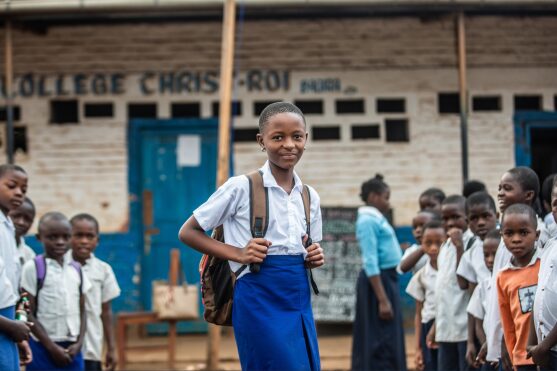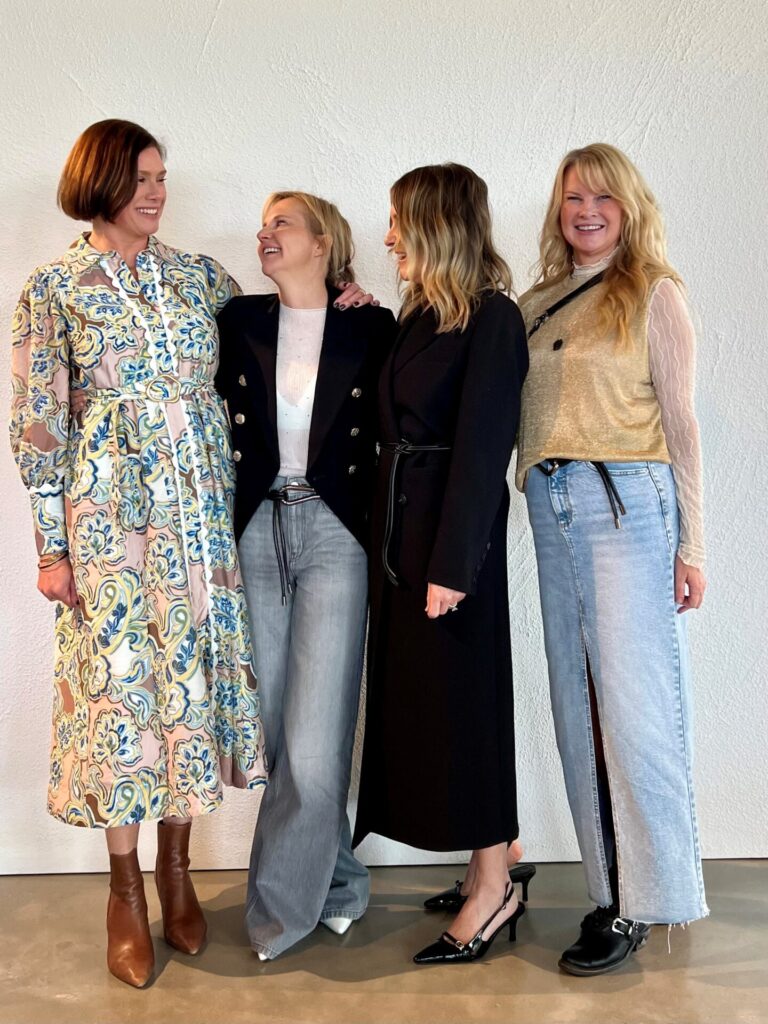War Child Canada: How a Caribbean conversation is leading to a better education for Congolese girls

War has many victims and perhaps the most tragic are children. War Child Canada has established a radio education program so girls in the Democratic Republic of Congo can learn at home to avoid the risk of sexual attack on the way to school. The program is supported by DECJUBA Foundation after an unlikely meeting on Richard Branson’s island.
In 2019, Dr Sam Nutt, the founder of War Child Canada, was a guest speaker at a women’s business event at Sir Richard Branson’s private island in the Caribbean.
She felt a little out of place.
“I spend a lot of my time in war zones so I did ask myself what I was doing there, knowing that my talk was pretty heavy and might seem out of context,” she recalls. “But Tania Austin approached me, and we talked for a long time. It turned out to be a meeting of the minds.”

Tania Austin is owner and CEO of the female-founded Australian fashion label DECJUBA. With more than 140 stores in Australia and New Zealand, and more than 1,600 staff, the company has a commitment to supporting a range of not-for-profits (NFPs) through DECJUBA Foundation.
Over the following years – and throughout the pandemic – Sam and Tania discussed the deteriorating humanitarian situation in the Democratic Republic of Congo (DCR) in Central Africa. Violence in DCR had been the most brutal the country had seen in a decade. Since the end of 2021, the M23 rebel group had been terrorising villages in the northeast of the country, forcing 800,000 people to flee their homes.
The violence was having a profound impact on children’s access to formal education. Many families did not allow their daughters to walk to school due to the risk of assault, rape and abduction. Many schools were closed or destroyed.
Education through radio was the answer. Lessons were developed by teachers in conjunction with the Ministry of Education to meet the country’s educational standards. “We have had a presence in the Congo for nearly 20 years doing various interventions, but the radio education initiative developed from a small program involving reading skills,” Sam said. “When we realised that girls were being held back because of the high rates of sexual and gender-based violence, we started considering how we could create models without building physical schools.
“We used seed funding to use the basic technology of radio, which is ubiquitous across Africa, as a tool to allow girls to continue to participate in their education and to catch up on what they had missed,” Sam said. “Sometimes we used satellite radio and other times the teachers were given a USB stick. The early program results were incredibly impressive, but it was not enough to just run the radio lessons, we also needed trained teacher assistants.
“We created safe spaces in villages for girls and welcomed boys as well – which helped keep them from being dragged into militia groups – and mothers often joined in. It is amazing to see the amplification. You might target 30 children in a village, but suddenly you have 45 people in the class.”

Gill Whelan, the General Manager of DECJUBA Foundation, said their team was moved by War Child Canada’s work in DRC and felt strongly about education for girls in an area where their safety is in such jeopardy.
“The relationship between Sam and Tania grew from many months of conversations and demonstrates the importance of open and meaningful conversations between funders and charity leaders – you never know what outcomes might be achieved,” Gill said.
Gill said that DECJUBA Foundation strives to build long-term, impactful partnerships with NFPs and to gain a deep understanding of their mission in its quest to positively impact 25,000,000 lives by 2025.
The foundation has now committed a $750,000 three-year funding to the radio-based learning program in the DRC.
Sam said that War Child Canada was grateful for DECJUBA Foundation’s support.
“I quickly realised that DECJUBA has a very strong philanthropic focus, and we’re honoured to be one of the foundation’s partners,” she said.
During her visit to Australia recently to speak at DECJUBA Foundation’s inaugural summit and reunite with Tania, Sam also enjoyed conversations with the philanthropic sector.
“There is an extraordinary generosity and a very impressive level of global thinking and awareness in Australia,” she said. “I often find myself having to convince people that they should care about issues and be engaged as the first step, but that has not been my experience here.
“In Australia, people are very engaged and curious. They don’t need to be convinced that it’s worth caring about women and children in war zones. It is incredibly refreshing for me after working as a war zone doctor, and in the sector for 20 years.
“It can be frustrating when you are finally getting traction with a project, and then attention is diverted elsewhere. People immediately pivot to other crises and that can halt the great work that is already going on,” she said.
“I believe that is what would have happened with the radio initiative. We have all these girls who would benefit from the education program that we knew was working – but we wouldn’t have been able to move forward if not for Tania and the funding from DECJUBA Foundation.
“It’s people and companies like this that stop me banging my head against the wall. It’s a lifeline and changes people’s lives. That’s why we get out of bed every day.”
Dr Sam Nutt is a Canadian physician and philanthropist who is the founder and president of War Child Canada. She has more than 16 years’ experience working in war zones and has worked with children and their families on the frontline of many crises.
DECJUBA Foundation is the philanthropic arm of purpose-led Australian fashion brand, DECJUBA. Through long-term meaningful partnerships with charitable organisations, DECJUBA Foundation in on track to positively impact 25 million lives by 2025, focusing on five key areas: empowerment, experience, education, essentials and emergency relief. 1% from every DECJUBA sale goes to DECJUBA Foundation.